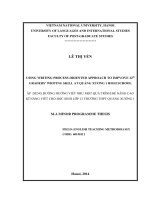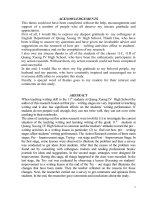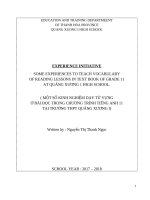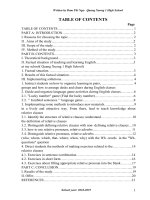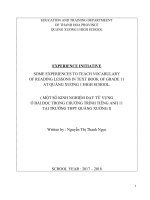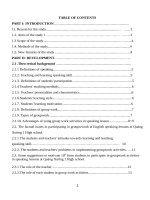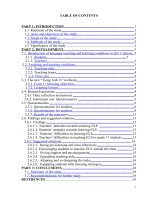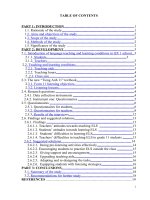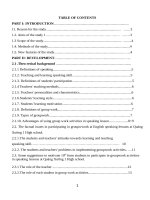(SKKN 2022) some techniques help the 12th grade students learn vocabulary effectively at quang xuong 1 high school
Bạn đang xem bản rút gọn của tài liệu. Xem và tải ngay bản đầy đủ của tài liệu tại đây (308.65 KB, 25 trang )
I. INTRODUCTION
1. Reason for choosing the topic
Vocabulary is the most fundermental factor in learning a language. Almost
every skill in language learning process requires learners to have ample and
good vocabulary.Vocabulary is important and necessary for building up a good
command of the language.Without vocabulary, it is unlikely that learners could
use the language correctly and with confidence.Therefore, Vocabulary is
reagrded as the fisst and the most funfermantal aspect a language learner must
master before developing language skills.
Good vocabulary is important for passive skills( reading and listening). It
enhances learners’comprehension and understanding of language.
Good vocabulary is important for active skills ( speaking and writing).
Every English conversation that is marked by some idioms and phrasal verbs
helps learners’expression become clear, interesting.Essay marked by the good
use of academic vocabulary makes learners’s writing become more formal for
important purposes.
Vocabulary knowledge is important because it encompasses all the words
we must know to access our background knowledge, express our ideas and
communicate effectively, and learn about new concepts. Students’ word
knowledge is linked strongly to academic success because students who have
large vocabularies can understand new ideas and concepts more quickly than
students with limited vocabularies. The more words you know, the more you
will be able to understand what you hear and read; and the better you will
be able to say what you want to when speaking or writing.
However, students have some difficulties in understanding a common
reading because of vocabularies. Reading texts often contain many new words
while their vocabulary is low. When encountering new words, they often stop to
look up a dictionary. This habit takes a lot of time to complete a reading and
1
makes students passive in vocabulary learning, reading comprehension,
vocabulary memorization and practicing them.
All in all, vocabulary is the core of langugae learning. It is important and
necessary for language comprehension and expression. It could be used as an
instrument to measure learners’language ability as well as their fluency.
2. Objectives of the study
Vocabuary play an important part in learing language. Therefore, in
students’success in school, not only does vocabulary improve reading
comprehension but also support students’writing and speaking as well as learing
in the context area.
In this study, I would like to show techinques in teaching vocabulary in
English textbook 12 for 12 grade students in order to improve the quality of the
lesson, motivate students to learn vocabulary, memerize and apply them
effectively.
3.Subjects of the study
- Techniques were implemented to 12 grade students
- 12 grade students of Quang Xuong 1 high school took part in the study.
They were chosen as the participants of the study because they are going to take
GCSE examination and English is core subject.
4. Methods of the study
In this study, I have used the following methods:
- Consolidating experiences
- Observing
- Reading documents
- Studying students’products
5. New points of the study
In my study I will introduce some new techniques in teaching vocabulary.
+ drawing
+ miming and gestures
+media
2
+ Pictures
+ semestic field
+ symnonym and antonym
+ affixes
II. CONTENTS OF THE STUDY
1. Rationale of the study
1.1. What vocabulary to teach ?
As we know, there are two types of vocabulary. They are: Passive
vocabulary and active vocabulary.
Passive vocabulary are words which a student can recognize but not
necessarily use in speaking or writing. If a student sees a word in their passive
vocabulary, he/she will understand what it means. Passive vocabulary words are
especially useful for receptive skills of reading and listening.
Active vocabulary are words which students can both understand and use
in communication .Active vocabulary words are especially useful for the
productive skills of speaking and writing .
A teacher should expect his/her students to understand words in reading
and listening before they can use those same words in speaking and writing.
When teaching, it is best to first train students to recognize words. Later the
teacher will find the students can actively use those same words in
communication.
1.2. Principles for teaching vocabulary :
If teachers want students to remember new vocabulary, it needs to be
learnt in context, practised, and then revised to prevent students from forgetting.
Teachers must make sure students have understood the new words, which will
be remembered better if introduced in a "memorable way" (Hubbard et. al.
1983:50). Bearing all this in mind, teachers have to remember to employ a
variety of techniques for new vocabulary teaching.
- Provide a context for new words: We will help the students guess the
meanings of the new words and remember easilier.
3
- Do not present too much new words at once. Teach a few words and
allow students to practise and use them a lot. This will help them remember
new words easily.
- Practising new words in context is more important than memorizing
isolated words. Students may be required to learn the meanings of words but
they must also be given the opportunity to use them productively in
speaking and writing.
- Teach your students skills for guessing new words, especially when
reading. The meaning of words can be inferred from the different types of
contexts and from looking at affixes (parts) of the word.
- Avoid translation as much as possible. If the students are always having
words translated, they are really only communicating in their own language , not
in Eglish. Also, students do not usually remember vocabulary that has been
translated. Only use translation as a last resort, when it would otherwise take too
long to communicate in English.
- Avoid using the dictionary a much as possible. When reading or
listening, students should first try guessing or ignoring new words so that they
can continue without stopping. Also using a dictionary when speaking or
listening often slows down communication. In writing, using a dictionary can be
beneficial. It helps students express themselves more clearly.
- Practise the new words in context first. Active words are needed to teach
first, ignore the passive words.
Those are the principles for teaching vocabulary. In my opinion, if all of us
follow those principles strictly, our students won’t find it difficult to remember
new vocabulary any more and we will get better feedback from our students.
2. Situation before applying the study
English is a compulsory subject at school and in the GCSE exam but
students, particularly grade 12 students, feel stressful to learn English. They find
many difficulties in learning grammar, pronouncing, especially in learning
vocabulary. They don’t have enough words to master reading, speaking,
4
listening and writing skills. They also have trouble in doing tests because of the
lack of vocabulary. Even they can’t find out any suitable methods to follow
when they want to concentrate on learning vocabulary. Therefore, they ignore
reading parts in tests or they complete reading parts without making sure that
which answer is correct although reading skill accounts for nearly half of the
mark in a test. In addition, many teachers of English at high schools don’t spend
enough time on teaching vocabulary. They only pay attention to grammar or
they still use old methods when teaching news words. They get students to
understand and remember new words passively.
Quang Xuong 1 high school is a school in rural of Quang Xuong. English
is a compulsory subject in the national high school examinations. However,
some of students still do not really care about the subject for some reasons. They
only focus on their exam subjects. English is a very special subject, making it
difficult for them if they do not really concentrate and practice it regularly.
Besides, they are rural students, the conditions for practicing English are not so
great. So the academic achievement of this subject is not high and there are still
weak students.
Result before the research in teaching
The first term of school year: 2021-2022
Class
12T2
12C2
Number of
Excellent-
Rather
Average
Weak (bad)
students
41
42
good (%)
5
3
(%)
14
16
(%)
19
22
(%)
3
1
Before investigating, proportion of weak students are high accounts for 3
to 9 percent and they are not interested in learning English especially learning
vocabulary.
3. Solutions to problems
There are a lot of vocabulary problems in teaching and learning process.
The factors can be caused by the individualized teacher, by the method that is
used, by the less of motivation and interest of the students in learning English, or
5
perhaps the students have difficulties in mastering vocabulary . So in this part of
the study, I would like to focus on techniques used in presenting and checking
vocabulary
to
improve
students’
vocabulary
mastery
and
motivate
students’English studies.
III. TECHNIQUES FOR TEACHING VOCABULARY
There are some effective techniques for presenting the meanings
of
words.
1. Drawing :
In the English language classroom, drawing is an engaging and effective
way for learners to record, evaluate and explore language. Drawing provides
pictures that may increase students’positive attitudes towards reading in general.
The use of simple drawing techniques allows learners to master foreign in an
enjoyable way. So when teaching vocabulary, teacher can draw picture of word
on the board that will
quickly convey the meaning.
E.g: -> happy
-> sad
2. Mime and gestures: Using gestures and mime is important when it comes
to vocabulary . Teacher can use them to elicit certain words and phrases from
students. When teaching vocabulary, it is also common to associate gestures
with words to help students remember vocabulary better. Using the same gesture
every time you say a particular word or phrase will help these students associate
the two.
This is the way of using actions and facial expressions to show the meaning of
words. Most action verb ( sits, stand, open…) and some adjectives showing
feelings and stantus ( happy, worried…) can be taught using mine and gestures.
3.Media ( using video): Almost any video can be used to teach English:
commercial films, TV programmers, home-made dramas and holiday films. This
way encourage students to guess the meaning of words.
Eg:(Unit 5, text book 12)When teaching vocabulary about cultural
identity, teacher can give a short video about a marriage in VietNam and
6
America. When
students watch video, they remember important words
throught imagines on screen:
Altar/ Master of celemony/ Banquet/ Groom/ Bridge/ Ancestor/Tray/ Schedule/
Blessing
4. Pictures: We can use pictures to communicate about many types of words.
E.g :(Unit 5, text book 12)
When teaching vocabulary about cutural diversity, teacher uses some
pictures to introduce words.
Traditional costumes
Cultural identity
belief
Trang phục truyền thống
Bản sắc văn hóa
tín ngưỡng
Cultural practices:
maintain
Phong tục văn hóa
duy trì
5. Antonym and symnonym :
a. Antonym: are words that have the same or a similar meaning. Synonyms can
provide students with variety in speech or writing, making it easy for you to
avoid overusing the same word and sounding repetitive. Some examples of
synonyms include the following:
7
Enormous = huge = gigantic = massive
Injured = damaged = wounded = harmed
Intelligent, clever, brilliant, knowledgeable
Look, glance, see, gaze, stare
Loyal, faithful, ardent, devoted
Old = elderly = aged = senior
Organization = institution= management
Partner = associate = colleague = companion
Polite = courteous = gracious
Quick = fast = swift = speedy = rapid
Risky = dangerous
astronaut = spaceman
prohibit
=
ban
b.symnonym: are words that have contrasting meanings. Antonyms can be
used to help show contrast between two things or give clues to exactly what
is meant. Below are some examples of antonyms:
appear # disappear
independent # dependent
Achieve # Fail
Ancient # Modern
Complex # Simple
Compliment #
Insult
Decrease # Increase
Demand # Supply
Destroy # Create
Powerful # Weak
Praise # Criticism
Problem # Solution
Professional # Amateur
Random # Specific
Simple # Complicated
Single # Married
Strength # Weakness
8
Tragic # Comic
Wealth # Poverty
6. Semantic field : Semantic (or sometimes called lexical) fields are a technique
often used to keep a certain image persistent in their learners' mind. They are a
collection of words which are related to one another be it through their similar
meanings, or through a more abstract relation.
Eg: Teaching vocabulary related to the topics in textbook.
* Urbanisation (Unit 2, text book 12): densely population, discrimination,
indusstrialisation, migrate, overload, overcrowded, umemployment,
resolution,slum……
* Green movement (Unit 3, text book 12): biomas, conservation, deplete,
geothermal, alternative, renewable, nonrenewable, fossil fuel, organic,
purification, replenish, sustainable….
* The mass media(Unit 4, text book 12): advent, cyberbullying,
documentary, medium, social netwworking, website, press, news,audience,
connect, computer, tablet…..
* Cultural identity(Unit 5, text book 12): cultural diversity,cultural
assimilation,culture shock,to abandon one’s own culture, traditional beliefs and
customs.to adopt a new culture, to be in danger of extinction,to experience great
culture shock,to bring a wide range of benefits to, to have a negative/detrimental
impact on…:, to get deeper insight into, to show great respect for,the growing
influence of western culture,the disapearance of some minority languages,a
multicultural society,people of different cultural backgrounds, tension and
conflict,to instil cultural, and traditional values into somebodythe loss of
traditional cultures = the disapearance of traditional ways of life….
* Work (Unit 8, text book 12): apply for, employer,employee,
qualification, candidate, experience, salary, skill, probation, shortlist…….
7. Guessing from context : Have students guess the meaning of word by reading
the
whole sentence.
Eg: + Online courses allow learners to study at flexible time.
9
+ Different learners have different learning styles.
After reading the whole sentences, students will be able to guess the meaning
of words:
Flexible: linh hoạt, linh động
Style: cách, kiểu
8. Guessing from affixes : Meaning of some words can be
mastered
through affixes, prefexes. Many new words are formed by adding an affix to the
beginning or end of a Latin or Greek root or root word. When affixes are added
to the beginning of roots or root words, they are called prefixes. When affixes
are added to the end of roots or root words, they are called suffixes.The teacher
can use prefixes or suffixes to show the meaning of new words.
Prefix
antidedisen-, emforein-, im-
Common Prefixes
Definition
against
opposite
not; opposite of
cause to
before; front of
in
in-, im-, il-, ir-
not
intermidmisnonoverpreresemisubsupertransununder-
between; among
middle
wrongly
not
over; too much
before
again
half; partly; not fully
under
above; beyond
across
not; opposite of
under; too little
Examples
anticlimax
devalue
discover
enact, empower
foreshadow, forearm
income, impulse
indirect, immoral, illiterate,
irreverent
interrupt
midfield
misspell
nonviolent
overeat
preview
rewrite
semifinal
subway
superhuman
transmit
unusual
underestimate
The teacher can use suffixes to teach vocabulary
10
Common Suffixes
Suffix
Definition
-able, -ible
is; can be
-al, -ial
having characteristics of
-ed
past tense verbs; adjectives
-en
made of
one who; person connected
with
more
the most
full of
having characteristics of
verb forms;present
participles
-er, -or
-er
-est
-ful
-ic
-ing
-ion, -tion,
-ation,-tion
-ity, -ty
-ive, -ative,
-itive
-less
-ly
-ment
-ness
Examples
affordable, sensible
universal, facial
the dog walked,
the walked dog
golden
teacher, professor
taller
tallest
helpful
poetic
sleeping
submission, motion,
relation, edition
state of
activity, society
active, comparative,
adjective form of noun
sensitive
without
hopeless
how something is
lovely
state of being; act of
contentment
state of; condition of
openness
riotous, courageous,
-ous, -eous, -ious having qualities of
gracious
-s, -es
more than one
trains, trenches
-y
characterized by
gloomy
9. Translation : This will save much time ,teacher will give a similar word
act; process
in
the students’ first language .
Eg: academic (a): học thuật
Activate (v): kích hoạt
Ambition(n): hồi bão, khát vọng
10. Using dictionary : If we need to save time or communicate about a
difficult word, the dictionary might be the best option.
IV. CHECKING VOCABULARY
11
1.What to check?
After teaching vocabulary , every teachers should check their students on
vocabulary of pronunciation , dictation , using and meaning. If their students
give good feedbacks , it means they are successful in teaching vocabulary .
Therefore , vocabulary are needed to check . It means pronunciation ,
dictation , using and meaning are needed to check.
2. when to check ?
In my opinion , After teaching vocabulary ,we can check our students’
understanding vocabulary ,or we can check in the end of the lesson as free
stages . But some teachers check vocabulary while students are practising
language skills . In short , we can check vocabulary at any stages of the
lesson,provided that our students can understand and use vocabulary to make
sentences and practise language skills .
3. How to check ?
There are many ways of checking vocabulary mentioned in other studies.
However, participants are 12th grade students, using exercises is the best ways to
check students’ vocabulary mastery. They are considered exercises as reading
passage, definition, matching the meaning, symnonym and antonym, gap
filling,multip choice…
3.1. A reading passage:
+ Students are asked to read the passage and will pay attention to the
context of the highlighted words. Teachers also help students access their prior
knowledge
of the theme
or topic of the passage.This will help improve
students’comprehension and figure out the word meaning as well.
+ Depending on the needs of individual students, teachers provide
students with a brief explaination of each new word.
+ Teachers guide students’focus and comprehension by having them
answer key
questions about the story.
+ Teachers invite some students to summarize the story.
+ Teachers encourage students to make more connections to the words so
that they can easily remember the words and interact with them in other
contexts.
12
Eg: ( Unit 8-text book 12- reading skill), teacher ask students to read the
text and focus on highlighted words
Apprentice Administrator in a Car Dealership
A successful car dealership specialising in second-hand cars is looking for
an apprentice administrator to provide administrative support for the team. This
would be a fantastic opportunity for someone looking for an entry-level position
in administration as no experience is required. The ideal candidate should also
be able to work on Saturdays.
Main responsibilities
- Answering telephone calls and responding to emails
- Meeting and greeting customers
- Filing and entering data
- Typing reports and creating spreadsheets
- Taking minutes at meetings
- Arranging meetings
Requirements
- 18 years of age or older
- Finished school with a National Certificate of Secondary Education
- Excellent time-management skills
- Good communication skills
- Well-spoken and articulate
- Responsible and self-motivated
- Flexible and eager to learn
- Friendly and approachable
- Well-organised
- Able to work to deadlines and prioritise tasks
The successful candidate will be offered:
- competitive salary
- ongoing training
- 12 days of annual leave
13
- long-term job prospects in the company after six-month apprenticeship
To apply for this position, send your CV and a covering letter to
For further information, please phone Ms Kim
Thanh at 0123975648.
Please note that only shortlisted candidates will be contacted.
Teacher introduce the situation of the reading text, encourages students to
master the highlighted words’meaning then told them to match these words with
the following meanings. Write the words in the space provided.
1. a person whose job is to manage and organise the public or business affairs of
a company or an institution
___ administrator___
2. becoming an expert in a particular area of work or business
__ specialising ____
3. put tasks or problems in order of importance so that you can deal with
the most important first
___priortise ___
4. selected for final consideration
___ shortlisted ___
5. friendly and easy to understand and to talk to
__ approachable___
In order to help students make more connections to the words so that they
can easily remember the words and interact with them in other contexts, teacher
encourage students to use these words in the corect form to complete each
sentence.
prioritize
specialize
shortlist
approach
1. A beauty salon___________ in hair and beauty treatment is looking for parttime shop assistants.
2. Being friendly and easy to talk to, he is seen as a/an _______ manager.
3. You can ________ tasks when you deal with the most important task first.
14
4. Don't be pessimistic if you are not ________the first time you apply for a job.
Look for other opportunities.
Suggested answer :
1.specializing
2. approachable
3. prioritize
4.shortlisted
3.2. definitions:
+ Students are give concise definitions and examples of usage and then
exercise set in which they are see and use the words in a variety of contexts.To
promote retention, students must interact with each words serveral times over
the course of a lesson.
+ Teacher can have a brief discussion about part of speech of some words
to help students increase their understanding of the definition and word use.
+ Some students are encourege to use the words in their speaking and writing.
Eg: (unit 6- textbook 12): The nouns in column A all appear in the
passage. Match each of them with a suitable definition in column B
A
Extinction
B
a. The existence of a larger number of differnet kinds of animal
and plants which make a balanced envitonment
Habitat
b. The act of preventing something from being lost, wasted,
damaged or destroyed
Biodiversity
c. a situation in which a plant, an animal, a way of life..stops
existing
d. The natural eviroment in which a plant or animal lives
Conservation
Teacher asks Ss to work in groups, encourage them to guess and match the
word which is suitable with its definition
T suggests Ss find words in the text and guess the meaning
T checks the answer
Suggested answers:
1.c
2.d
3.a
4.b
3.3. Match the meaning: The exercises helps students revise the meaning of
the words from the lesson, interact with the words and relate them to their own
experiences.
Eg: Match the words with their meanings.(Unit 9-textbook 12)
15
1. unique (adj)
2. tip (n)
3. cluttered (adj)
4. tailor (v)
5. personnel (n)
a. the department in a company that deals with
employing and training people
b. very special
c. a useful piece of advice about something practical
d. full of details in an untidy way
e. adapt something for a particular purpose
Suggested answer
1. b
2. d
3. a
4. e
5. c
1. unique (adj) - very special
2. tip (n) - a useful piece of advice about something practical
3. cluttered (adj) - full of details in an untidy way
4. tailor (v) - adapt something for a particular purpose
5. personnel (n) - the department in a company that deals with employing
and training people
3.4.Synonyms and Antonyms: The exercises helps students revise the
meaning of the words from the lesson and expand their vocabulary.
Eg (unit 3-textbook 12): With the topic “the green movement”, teacher can
revise the meaning of the words from the lesson.
Mark the letter A, B, C or D to indicate the word(s) CLOSEST in
meaning to the underlined word(s) in each of the following questions.
1. For environmental safety, we need to find ways to reduce emission of
fumes and smoke of factories.
A. leak
B. release
C. poison
D. pollutant
2. Nylon is a man-made fibre, the use of which has helped more people to have
cheaper and more colourful clothes to wear.
A. natural
B. plastic
C. synthetic
D. artificial
3. The advances of commercial airplanes resulted in a shrinking world.
A. decreasing
B. reduced
C. smaller
D. compressing
4. We have to suffer from traffic congestion and pollution every day.
A. accident
B. fullness
C. mass
16
D. crowd
5. Many animals were born in captivity. Resultantly, they do not always breed
well.
A. imprisonment B. lock
C. detention
D. freedom
6. The African rhino is an endangered species and needs protecting.
A. unstable B. dangerous
C. insecure
D. indefensible
7. We can protect many species by keeping them in wildlife reserves.
A. protected land B. saved land
C. park
D. Zoo
8. Scientists are trying to find an energy that consumes less fuel.
A. waste
B. destroy
C. eat up
D. use
9. Modern buildings are designed to maximize natural light.
A. absorb
B. increase
C. let
D. diminish
10. It's wise to use local fresh produce which is in season.
A. cars
B. restaurants
C. crops
D. Water
Suggested answers
1B
2D
3C
4D
5B
6C
7A
8D
9B
10C
Mark the letter A, B, C or D to indicate the word(s) OPPOSITE in meaning
to the underlined word(s) in each of the following questions.
1. The new policy will help generate more jobs.
A. bring out
B. form
C. produce
D. terminate
2. Her only problem is the limited experience because she is too young.
A. narrow
B. considerable
C. insufficient
D . restricted
3. The river is badly polluted with toxic chemicals from that factory.
A. poisonous
B. harmful
C. all right
D. deadly
4. I don't believe in anything he says, he is unreliable.
A. inaccurate
B. unstable
C. trustworthy
D. irresponsible
5. 'If we continue to deplete our planets natural resources, we will damage the
environment significantly.
A. use up
B. add to
C. reduce
D. exhaust
6. She stays incredibly focused and is never distracted by others.
A. disturbed
B. confused
C. bewildered
17
D. concentrated
7. Globally, farmers encroach on forest land to grow crops.
A. leave
B. invade
C. make road to
D. intrude
8. Poverty in many African countries increases the likelihood that people poach
animals to earn their living.
A. chance
B. prospect
C . possibility
D. improbability
9. Funds are diverted from conservation to military because of war.
A. redirected
B. shifted
C. stayed
D. turned aside
10. The number of rhinos is in steady decline. There are fewer rhinos than ever
before.
A. occasional
B. constant
C. stable
D. Persistent
Suggested answers
1D
2B
3C
4C
5B
6D
7A
8D
9C
10A
Or: Find each pair of antonym from the following:
Boring
Rewarding
Dangerous
Difficult
Fantastic
Easy
Fascinating
Unsastified
Grotesque
Safe
Suggested answers
Boring
Rewarding
Dangerous
Difficult
Fantastic
Fascinating
Unsastified
Safe
Easy
grotesque
Or: Find each pair of synonym from the following:(Unit 10- textbook 12)
emission
man-made
congestion
consumes
maximize
increase
use
release
crowd
artificial
Suggested answers
emission
man-made
congestion
consumes
maximize
release
artificial
crowd
use
increase
18
4.The effectiveness of the study in teaching and learning :
Result after the research in teaching
The second term of school year: 2021-2022
Class
12T2
12C2
Number of
Excellent-
Rather
Average
Weak (bad)
students
41
42
good (%)
15
≈9
(%)
19
22
(%)
7
11
(%)
0
0
This quantitative research involved 83 students as its sample. The pretest,
treatments, and posttest were used in this study. The data obtained through test
were analyzed to find its mean score and the score of tests. The result of the
study shown that the excellent-good students accounted from 5- 7 percent after
applying the research in teaching help students interested in increased 21% to
36%; rather students accounted from 33-38 percent increased 46-52 percent and
no bad students.It means that the students were interested and these techniques
are suitable in teaching English vocabulary.
The study has some certain effects on not only teachers and their teaching
but also students and their learning. After using new techniques in teaching
vocabulary, I and other teachers in my school have had deep understanding that
teaching voabulary is not a tedious process but an interesting and active one.
Students feel motivated to learn vocabulary. They find it easier and more
exciting to remember new words. They are really active learners in many
lessonss. Vocabulary is not difficult to them any more. Their results in the exam
are much higher than those of the students in the class in which teachers don’t
use these techniques. Therefore, the study has an important part in improving the
quality of general education in my school
V. CONCLUSION AND REQUEST
1. Conclusion: To sum up, vocabulary is very important and there are
numerous ways of teaching and learning vocabulary. Each teacher has her/his
own way of teaching vocabulary but the characteristics of teaching
vocabulary are the same in any languages. The final purpose of every teacher
19
is to enlarge students’ vocabulary in order to help them to be good listeners,
speakers, readers, and writters in any languages. Techniques I have mentioned
above are not all but not least. I hope they will bring teachers and learners an
effective way to master English.
2. Request :There are no private lessons for teaching vocabulary so it’s
advisable for teachers to use these games at the beginning to warm up the
lesson or at the end to consolidate the lesson. Teachers should combine these
techniques flexibly to have the best result. The study is not perfect and
mistakes are unavoidable because of limited time and my inexperience. It
needs lots of comments and ideas in order to be a better one. Therefore,
comments and remarks are welcome so that the subject matter will be
discussed more thoroughly. School Leaders’ confirmation Hereby, I certify
that the study is the result of my own research.
XÁC NHẬN CỦA
THỦ TRƯỞNG
ĐƠN VỊ
Thanh Hóa, ngày tháng 5 năm 2022
Tơi xin cam đoan đây là SKKN của mình
viết, không sao chép nội dung của người
khác
Người viết
Nguyễn Thị Thanh Ngọc
20
REFERENCES
1. Dale, E. , & O’Rourke, J. (1986). Vocabulary building. Columbus, OH:
Zaner
Bloser.
2. Ebbers, S.M. (2004). Vocabulary through morphemes: Suffixes, prefixes and
roots for intermediate grades. Longmont, CO: Sopris West
3. Rupley, W.H., Logan, J.W., & Nichols, W.D. (1998/1999). Vocabulary
instruction in a balanced reading program. The Reading Teacher, 52 (4).
4. Scott, J.A., & Nagy. W.E. (1997). Understanding the definitions of
unfamiliar
verbs. Reading Research Quarterly, 32.
5. Scott, J.A. & Nagy, W.E. (2003). Developing word consciousness.
6. J. Baumann and E. Kame’enui (Eds.) Vocabulary Instruction: Research to
Practice, New York: Guilford Publications.
7. Stahl, S.A., Richek, M.A., & Vandevier, R.J. (1991) Learning meaning
vocabulary through listening: A sixth grade replication. In J.Zutell & S.
McCormick (Eds.) Learner factors/teacher factors: Issues in literacy
research instruction (pp.185-192). The Fortieth Yearbook of the National
Reading
Conference, Chicago, IL.
8. Stahl, S.A. (1999). Vocabulary development. Newton Upper Falls, MA:
Brookline Books.
21
TABLE
OF CONTENTS
EDUCATION
AND TRAINING
DEPARTMENT
OF THANH HOA PROVINCE
I : INTRODUCTION
XUONG
1.1.Reasons QUANG
for choosing
the topic I HIGH SCHOOL
1.2 Objective of the study
1.3. Subject of the study
1.4.Methods of the study
II: CONTENT OF THE STUDY
1.Rationale of the study
1.1What vocabulary to teach
1.2.Principles for teaching vocabulary
2. Situation before applying the study
3. Solutions to problems
III. TECHNIQUES FOR TEACHING VOCABULARY
1.Present the meanings of new words
EXPERIENCE
INITIATIVE
2. Present the forms/
functions/ the uses
IV.CHECKING
VOCABULARY HELP THE 12TH GRADE
SOME TECHNIQUES
1. What to check
STUDENTS
LEARN VOCABULARY EFFECTIVELY
2. When to check
3. HowAT
to check
QUANG XUONG I HIGH SCHOOL
4.The effectiveness of the study in teaching and learning
V. CONCLUSION AND REQUEST
1. conclusion
2. Request
22
Written by: Nguyễn Thị Thanh Ngọc
23
